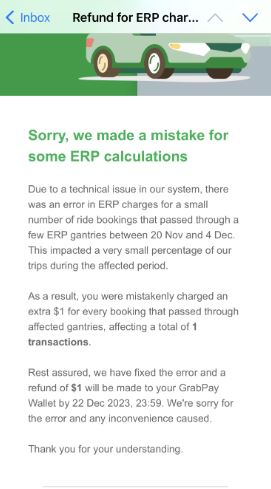In a recent revelation, more than 40,000 Grab passengers found themselves overcharged due to the ride-sharing giant’s mobile application using outdated Electronic Road Pricing (ERP) rates, according to Channel NewsAsia.
Despite the unsettling nature of the issue, Grab assures that the error has been identified and rectified.
Land Transport Authority (LTA) and Public Transport Council (PTC) Response
Upon receiving feedback about overcharged trips, the LTA and PTC took swift action. They directed Grab to thoroughly examine its data to identify and correct instances of overcharging. This proactive approach demonstrates the commitment of regulatory bodies to uphold fair practices within the ride-sharing industry.
Grab’s internal investigation revealed that 60,787 trips, spanning from Nov 20 to Dec 4, were affected by the outdated ERP rates. This miscalculation impacted 40,431 passengers, with excess ERP charges ranging from S$1 to S$3 for the majority of affected individuals. The discovery prompted Grab to take immediate corrective measures.
Grab’s Response and Actions Taken
In response to the issue, Grab acknowledged the error and swiftly updated the ERP rates in its backend system. The company has since taken steps to reimburse all affected passengers. Grab expressed regret over the inconvenience caused and assured customers that measures have been implemented to prevent similar incidents in the future.
It’s worth noting that the overcharging occurred during a period when ERP rates were temporarily reduced. Grab explained that a backend syncing issue prevented the automated ERP feature from updating the rates accurately. While the affected rides were a small percentage of the total during this timeframe, Grab acted promptly to rectify the situation.

Impact on Passengers
The impact on passengers was limited, with Grab stating that only a very small percentage of rides between Nov 20 and Dec 4 were affected. Grab took proactive steps to notify affected customers and promptly issued refunds, demonstrating the company’s commitment to customer satisfaction.
Grab’s driver app plays a crucial role in determining fares through its automated ERP feature. This feature populates prevailing ERP rates based on the route taken during a trip. Grab drivers also have the ability to edit ERP rates, giving them flexibility in fare adjustments. Grab has double-checked ERP pricing for all gantries in its system to ensure accuracy.
Grab’s Apology and Preventive Measures
Expressing sincere apologies to consumers, Grab acknowledged the inconvenience caused by the overcharging issue. In addition to addressing the immediate problem, Grab has implemented additional internal testing and preventive measures to avoid similar incidents in the future. The company’s commitment to transparency and improvement is evident in its response.
LTA and PTC have assured the public that they will investigate the incident thoroughly. The regulatory bodies emphasize that operators of ride-hailing services bear the responsibility of ensuring accurate fares are charged to passengers. This investigation underscores the importance of regulatory oversight in maintaining industry standards.
